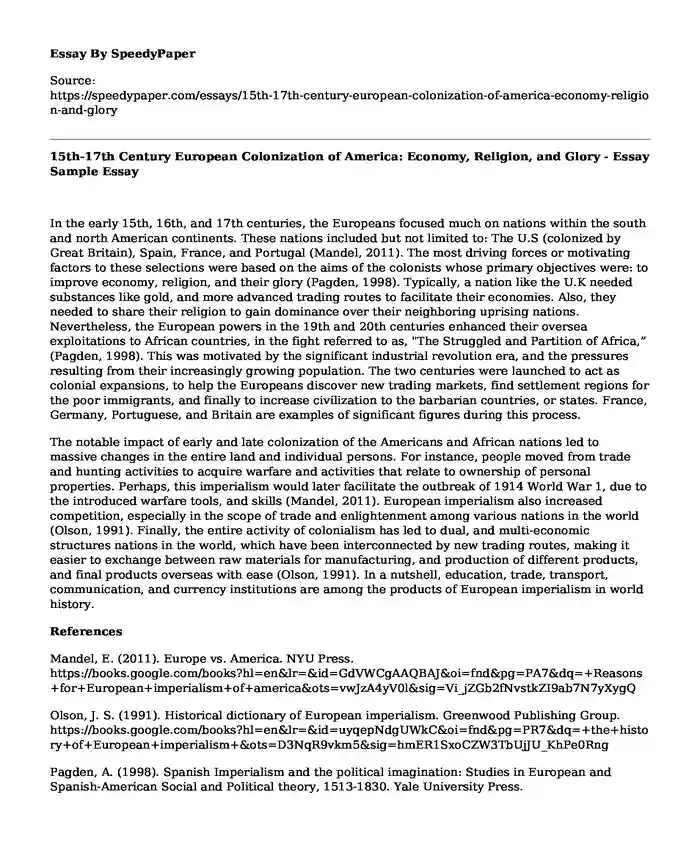
| Type of paper: | Essay |
| Categories: | History Political science American history |
| Pages: | 2 |
| Wordcount: | 403 words |
In the early 15th, 16th, and 17th centuries, the Europeans focused much on nations within the south and north American continents. These nations included but not limited to: The U.S (colonized by Great Britain), Spain, France, and Portugal (Mandel, 2011). The most driving forces or motivating factors to these selections were based on the aims of the colonists whose primary objectives were: to improve economy, religion, and their glory (Pagden, 1998). Typically, a nation like the U.K needed substances like gold, and more advanced trading routes to facilitate their economies. Also, they needed to share their religion to gain dominance over their neighboring uprising nations. Nevertheless, the European powers in the 19th and 20th centuries enhanced their oversea exploitations to African countries, in the fight referred to as, "The Struggled and Partition of Africa,” (Pagden, 1998). This was motivated by the significant industrial revolution era, and the pressures resulting from their increasingly growing population. The two centuries were launched to act as colonial expansions, to help the Europeans discover new trading markets, find settlement regions for the poor immigrants, and finally to increase civilization to the barbarian countries, or states. France, Germany, Portuguese, and Britain are examples of significant figures during this process.
The notable impact of early and late colonization of the Americans and African nations led to massive changes in the entire land and individual persons. For instance, people moved from trade and hunting activities to acquire warfare and activities that relate to ownership of personal properties. Perhaps, this imperialism would later facilitate the outbreak of 1914 World War 1, due to the introduced warfare tools, and skills (Mandel, 2011). European imperialism also increased competition, especially in the scope of trade and enlightenment among various nations in the world (Olson, 1991). Finally, the entire activity of colonialism has led to dual, and multi-economic structures nations in the world, which have been interconnected by new trading routes, making it easier to exchange between raw materials for manufacturing, and production of different products, and final products overseas with ease (Olson, 1991). In a nutshell, education, trade, transport, communication, and currency institutions are among the products of European imperialism in world history.
References
Mandel, E. (2011). Europe vs. America. NYU Press. https://books.google.com/books?hl=en&lr=&id=GdVWCgAAQBAJ&oi=fnd&pg=PA7&dq=+Reasons+for+European+imperialism+of+america&ots=vwJzA4yV0l&sig=Vi_jZGb2fNvstkZI9ab7N7yXygQ
Olson, J. S. (1991). Historical dictionary of European imperialism. Greenwood Publishing Group. https://books.google.com/books?hl=en&lr=&id=uyqepNdgUWkC&oi=fnd&pg=PR7&dq=+the+history+of+European+imperialism+&ots=D3NqR9vkm5&sig=hmER1SxoCZW3TbUjJU_KhPe0Rng
Pagden, A. (1998). Spanish Imperialism and the political imagination: Studies in European and Spanish-American Social and Political theory, 1513-1830. Yale University Press.
Cite this page
15th-17th Century European Colonization of America: Economy, Religion, and Glory - Essay Sample. (2023, Sep 27). Retrieved from https://speedypaper.com/essays/15th-17th-century-european-colonization-of-america-economy-religion-and-glory
Request Removal
If you are the original author of this essay and no longer wish to have it published on the SpeedyPaper website, please click below to request its removal:
- Free Essay Discussing the Nigerian Taboos from a Comparative Perspective
- Biology Essay Example: Respiration and Photosynthesis Cycle
- Political Liberty - Free Paper Example with an Annotated Bibliography
- Free Essay Sample on Extracellular Vesicles
- Essay Example Describing the "Unthing" Experiment
- Essay Sample on Functions of the Lymphatic System
- The Dimensions of Software Engineering Success. Free Essay
Popular categories




